Do New Zealand Rabbits Make Good Indoor Pets?
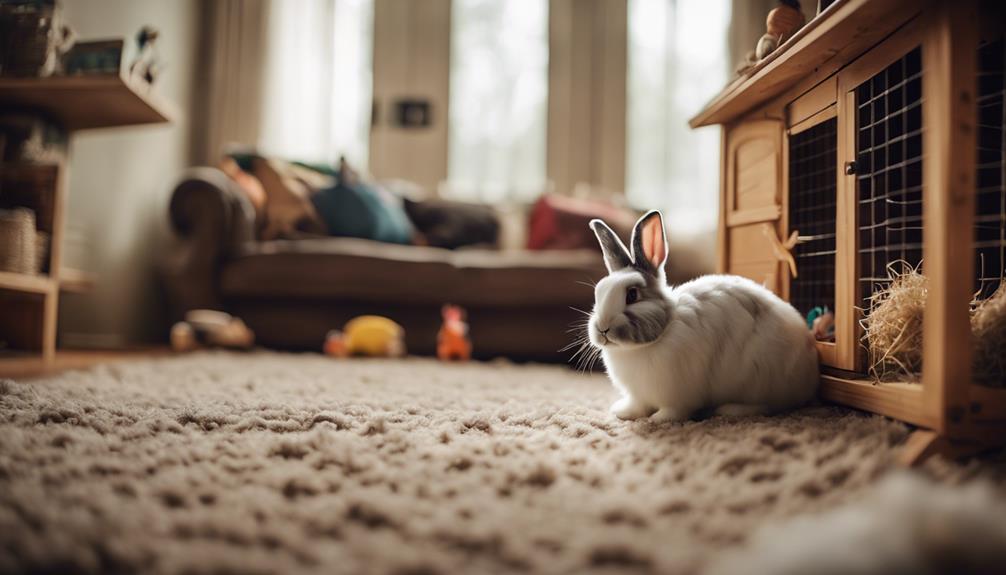
New Zealand rabbits are a popular choice for indoor pets due to their friendly and social nature. They are known for their gentle demeanor and ease of handling, making them ideal companions for families with children or individuals looking for a furry friend. However, it is essential to consider some factors before bringing a New Zealand rabbit into your home.
One important consideration is the amount of space required for a New Zealand rabbit to thrive indoors. These rabbits are active animals that need ample room to move around and exercise. Providing a spacious enclosure or free-roaming area is crucial for their physical and mental well-being. Additionally, New Zealand rabbits have specific dietary needs that must be met to ensure their health and longevity. A diet rich in hay, fresh vegetables, and a small amount of pellets is essential for keeping these rabbits healthy and happy.
Another factor to consider is the time and effort required to care for a New Zealand rabbit properly. These pets need regular grooming to maintain their coat and prevent matting, as well as routine nail trims to keep their claws in check. Additionally, providing mental stimulation through toys and interactive playtime is essential to prevent boredom and ensure a happy and contented rabbit.
In conclusion, New Zealand rabbits can make wonderful indoor pets with the right care and consideration. By providing them with a spacious living environment, a proper diet, and regular grooming and mental stimulation, you can enjoy a rewarding and fulfilling relationship with your furry companion.
New Zealand Rabbit Characteristics
New Zealand rabbits exhibit a variety of fur colors including black, bluish-gray, reddish-orange, or mixed variations, and typically weigh between 9 to 12 pounds on average. These characteristics make them a popular choice as pets for many individuals. Known for their gentle nature and social demeanor, New Zealand rabbits can thrive as indoor pets when provided with adequate care and attention. Their lifespan, ranging from 5 to 8 years, allows for long-lasting companionship.
In terms of care, New Zealand rabbits require a balanced diet rich in hay, fresh vegetables, and pellets, along with access to clean water at all times. Regular grooming is essential to maintain their dense coat and overall health. Due to their friendly disposition, these rabbits enjoy human interaction and can be easily litter-trained, making them suitable for indoor living spaces. Their adaptability and calm temperament further contribute to their reputation as excellent indoor pets.
Indoor Housing for New Zealand Rabbits
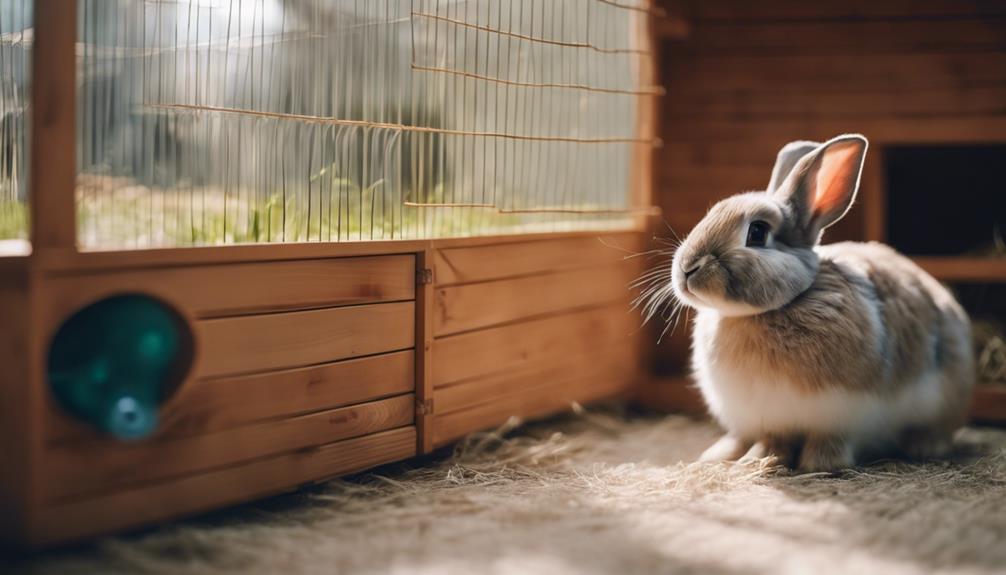
New Zealand rabbits require spacious indoor housing to accommodate their need for exercise and hopping.
Providing ample cage size, suitable bedding, and litter options are essential factors to consider when setting up their living space.
Ensuring areas are rabbit-proofed is crucial to prevent chewing and maintain their safety indoors.
Cage Size Requirements
To ensure the well-being and comfort of New Zealand rabbits, providing an indoor enclosure that's 4-6 times their stretched-out length is essential. When considering cage size requirements for New Zealand rabbits, there are several key factors to keep in mind:
- Adequate Space: New Zealand rabbits need at least an eight square foot enclosure to move freely.
- Rabbit-Proofing: Indoor housing should be rabbit-proofed to prevent chewing and digging.
- Avoid Small Cages: Opt for larger spaces like dog playpens instead of small commercial cages.
- Predator Protection: A spacious environment not only provides room for movement but also protects New Zealand rabbits from predators and harsh weather conditions.
Bedding and Litter Options
Considering the importance of providing a comfortable and safe indoor environment for New Zealand rabbits, selecting appropriate bedding and litter options is crucial for their well-being.
It's recommended to use rabbit-safe bedding such as paper-based options to prevent respiratory issues in indoor housing. Avoid cedar or pine bedding as the aromatic oils can be harmful. Opt for soft and absorbent bedding materials to ensure comfort and control moisture in the indoor habitats of New Zealand rabbits.
Fleece liners or hay-based bedding can be good alternatives for easier maintenance and cleanliness. Remember to regularly clean and change the bedding to prevent odor buildup and maintain a healthy indoor environment for your New Zealand rabbits.
Diet and Nutrition for New Zealand Rabbits

New Zealand rabbits require a balanced diet that includes hay, fresh leafy vegetables, store-bought pellets, and limited fruits like apples and berries.
Ensuring hay is always available aids in digestion and dental health, while avoiding high-sugar or high-starch foods helps prevent obesity and gastrointestinal issues.
It's crucial to provide fresh water continuously and monitor their diet to meet the rabbits' nutritional needs for optimal health.
Feeding Requirements for New Zealand Rabbits
When caring for New Zealand rabbits, ensuring a balanced diet that includes hay, fresh leafy vegetables, store-bought pellets, and limited fruits like apples and berries is essential for their optimal nutrition.
- Hay: Provides essential fiber for proper digestion.
- Fresh Leafy Vegetables: Offer vitamins and minerals crucial for overall health.
- Store-Bought Pellets: Ensure a balanced diet with necessary nutrients.
- Limited Fruits: Serve as occasional treats due to their sugar content.
It's vital to provide constant access to fresh water to keep New Zealand rabbits hydrated. By limiting sugary treats and maintaining a fiber-rich diet, digestive issues can be prevented. Monitoring the rabbit's weight and consulting with a veterinarian for tailored dietary recommendations are key steps in promoting their well-being.
Nutritional Needs of Rabbits
To ensure the optimal health and well-being of New Zealand rabbits, their diet must consist of high-quality hay, fresh leafy vegetables, limited store-bought pellets, and occasional fruits rich in essential nutrients and fiber.
New Zealand rabbits require a diet rich in high-quality hay, like timothy hay, to aid in digestion and prevent dental issues. It's essential to feed them a balanced diet that includes fresh leafy vegetables daily to provide necessary nutrients and fiber.
While store-bought rabbit pellets should be given in moderation to supplement their diet with essential vitamins and minerals, fruits such as apples and berries can serve as occasional treats.
Proper nutrition plays a crucial role in maintaining the health and preventing obesity and other diet-related health issues for New Zealand rabbits kept as indoor pets.
Grooming Tips for New Zealand Rabbits
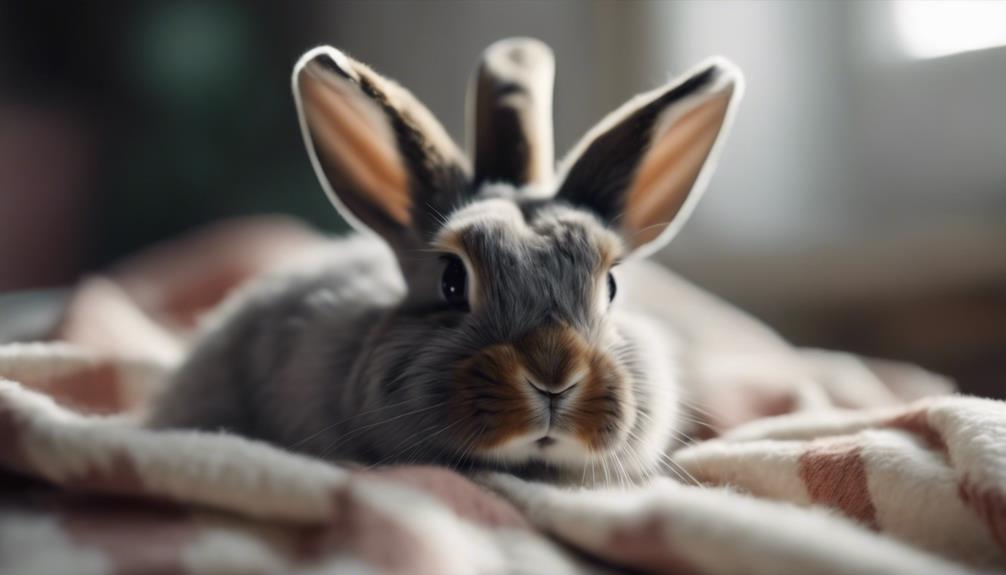
Regular grooming of New Zealand rabbits is essential to maintain a healthy coat and prevent matting. Here are some grooming tips for keeping your New Zealand rabbit in top condition:
- Brush Regularly: New Zealand rabbits have short fur that requires regular brushing at least once a week to remove loose fur and minimize shedding around your home.
- Check Hindquarters and Underbelly: Pay close attention to the rabbit's hindquarters and underbelly during grooming sessions to inspect for any signs of soiling or matting that may require attention.
- Trim Nails: Trim your rabbit's nails every 4-6 weeks to prevent overgrowth, which can lead to discomfort while hopping and potential health issues.
- Bonding and Monitoring Health: Use grooming sessions as an opportunity to bond with your New Zealand rabbit. Additionally, monitor their overall health and well-being during these times, checking for any changes in behavior or physical condition that may require veterinary attention.
Health and Wellness of New Zealand Rabbits
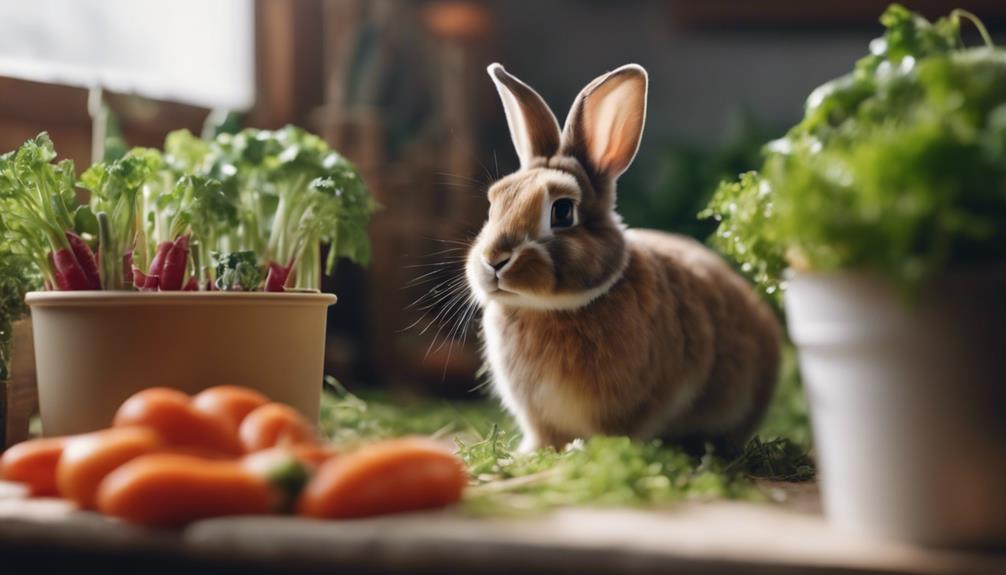
Ensuring the health and wellness of New Zealand rabbits requires regular veterinary check-ups and proactive dental care to manage teeth growth. New Zealand rabbits need consistent monitoring for dental problems, as they're prone to issues with teeth growth. Providing appropriate chew toys can help prevent these problems.
Additionally, regular exercise is vital for maintaining the health of New Zealand rabbits and preventing obesity. Owners should watch out for signs of gastrointestinal stasis, a condition these rabbits are susceptible to, and seek veterinary care promptly if any symptoms arise.
With a lifespan of 5-8 years, proper diet, exercise, and grooming are essential for the well-being of New Zealand rabbits. By staying attentive to their dental health, ensuring regular veterinary check-ups, providing opportunities for exercise, and being mindful of their diet, owners can help their New Zealand rabbits live healthy and fulfilling lives.
Interaction and Socialization With New Zealand Rabbits

Maintaining a harmonious indoor environment with New Zealand rabbits involves regular socialization and playtime to keep them happy and healthy. These gentle and outgoing pets thrive on interaction with their human companions, making them great additions to the family.
To ensure a positive experience with your New Zealand rabbit indoors, consider the following:
- Supervised Interaction: Always supervise interactions between your rabbit and other pets or children to prevent any accidental harm or stress to the rabbit.
- Avoiding Stress Triggers: Be mindful of loud noises or sudden movements that could startle or stress your rabbit, leading to potential territorial behavior.
- Regular Socialization: Dedicate time each day to interact with your rabbit through gentle petting, talking, or play to strengthen your bond and keep them mentally stimulated.
- Neutering: Consider neutering or spaying your rabbit to help prevent territorial behavior and ensure a peaceful coexistence within your indoor space.
Cost Considerations for New Zealand Rabbit Ownership
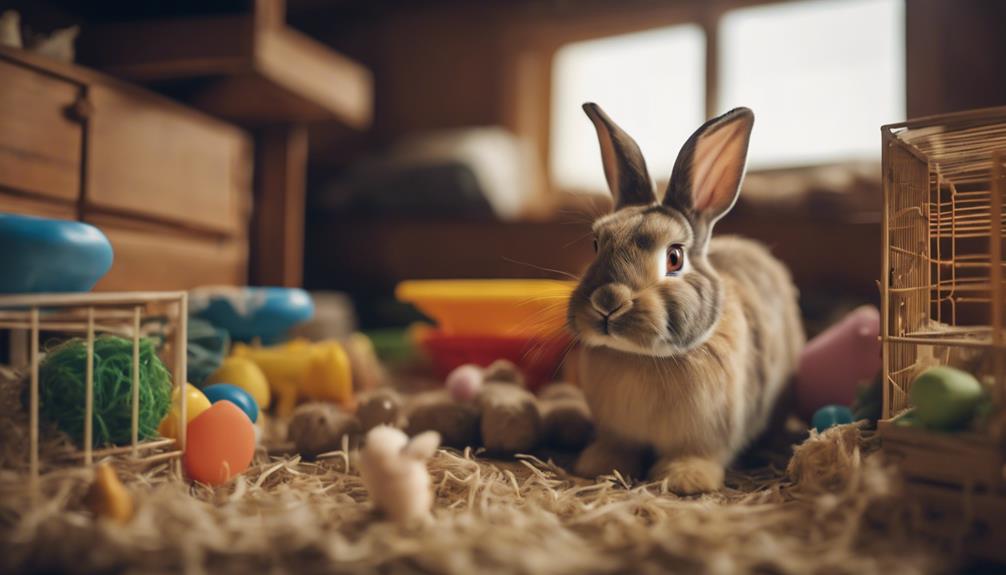
When considering the ownership of a New Zealand rabbit, it is essential to factor in the various costs associated with their care and maintenance. Here is a breakdown of the cost considerations for New Zealand rabbit ownership:
| Cost Category | Description | Examples |
|---|---|---|
| Initial Setup Expenses | Costs incurred when setting up the rabbit's habitat, including a cage, bedding, food dishes, and toys. | Cage, bedding, food dishes, water bottle |
| Ongoing Costs | Regular expenses for the rabbit's daily needs, such as high-quality hay, fresh vegetables, and pellets. | Hay, vegetables, pellets |
| Veterinary Care | Essential medical care including spaying/neutering, vaccinations, check-ups, and potential emergencies. | Spaying/neutering, vaccinations, check-ups |
| Unexpected Costs | Budgeting for unforeseen expenses like illness, injury, or additional supplies for responsible ownership. | Emergency vet care, extra supplies |
Budgeting for these various costs is crucial for ensuring the well-being of a New Zealand rabbit and being a responsible pet owner.
Frequently Asked Questions
Do New Zealand Rabbits Like to Be Held?
New Zealand rabbits generally enjoy being held if handled gently and gradually. They prefer shorter sessions initially and respond well to positive handling. Respecting their boundaries, using treats, and building trust can help them feel comfortable and secure.
What Bunny Is Best for a House Pet?
For a house pet, the best bunny behavior indoors involves creating a safe environment, using positive training techniques, offering bonding time, engaging in playtime activities, attending to grooming needs, considering health aspects, and encouraging social interactions for a happy rabbit.
How Much Room Does a New Zealand Rabbit Need?
A New Zealand rabbit requires a spacious living area to meet its exercise needs. Indoor habitats should have a minimum enclosure size of eight square feet for ample roaming space. It's essential to provide proper housing requirements for their activity levels.
How Long Do New Zealand Rabbits Live in Captivity?
New Zealand rabbits in captivity typically live 5 to 8 years, with some reaching up to 10 years with proper care. Factors like diet, exercise, health check-ups, and enriched environments play key roles in their longevity.









